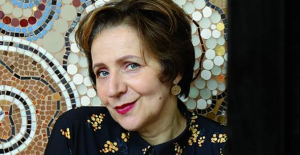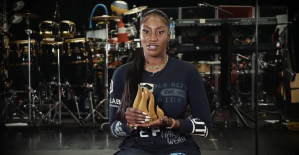A woman sits on a park bench on Tempelhofer Feld in Berlin. In this article she only wants to be referred to by her first name. The Pole, who has been living in Germany for several years, talks about the work of a group of activists to which she belongs. They are part of a network that operates across Europe, but little is known about it.
The activists, says Gosia, have to protect their identities. What they do is prosecuted in some places by public prosecutors and the police. Death threats are also part of everyday life for many. The activists are concerned with a major political idea: Every woman, in Europe and around the world, should be able to end an unwanted pregnancy.
To implement this idea, the women are breaking the law in several countries, such as Poland and Malta: they are sending abortion pills through the mail. In more advanced pregnancies, like Gosia's collective Ciocia Basia (German: Tante Barbara), they bring Polish women to German abortion clinics. The network is spreading a number on the Internet: In Poland alone, it has made it possible for almost 80,000 women to have an abortion since October 2020.
The work of this network has recently become the focus of public attention because the political climate for abortion rights has changed: Not only in the USA, one of the supposedly most progressive countries in the world, there is a risk of significant tightening of the laws following a landmark decision by the Supreme Court. In Italy, too, conservatives and the extreme right are now trying to restrict access to abortion doctors.
These developments give the abortion activists a boost: the donations they receive from private sponsors and in some cases from government agencies have risen significantly, according to the groups. Reporters from WELT, POLITICO and Newsweek Polska have researched who is behind the network and how it works.
The idea that home pills could help women circumvent abortion laws came from doctor Rebecca Gomperts, who now lives in the Netherlands. 17 years ago she founded an organization called Women on Web. The group began counseling women from countries with strict abortion laws and sourced mifepristone and misoprostol, the two drugs that together cause abortion, through Indian drug companies.
Even today, the organization helps with abortion pills. The activists advise the women on how to use them and offer them mental support via video chat or telephone. From the point of view of the World Health Organization (WHO), there is nothing medically against its use: the method is safe up to the 12th week of pregnancy.
Similar organizations modeled on Women on Web gradually emerged in several EU countries and over time they began to work more closely together: Women Help Women in Amsterdam, Abortion Dream Team in Poland, Ciocia Basia in Berlin and the Abortion Support Network In the United Kingdom. They are all part of a coalition called Abortion Without Borders.
Venny Ala-Siurua from the original group Women on Web, who provides information over the phone, explains how the assistance is provided: Unwanted pregnant women from all over the world, she says, contacted and filled out an online questionnaire. A team of doctors working on a voluntary basis checks this and then issues a prescription. The activists collect the funds and mail them to the women. The pregnant women take the medication under supervision: first the mifepristone, which thins the uterine lining. Then the misoprostol, in the form of a pill or suppository, which causes cramps and expels the embryo.
The activists do not reveal exactly where the groups get the pills from. They only say this much: the drugs came from European and Asian pharmaceutical suppliers and are easy to obtain: misoprostol, explains Ala-Siurua, is actually a remedy for stomach pains. It is a bit more difficult with mifepristone, which requires a prescription. With the wires that the network has, however, it can be procured from various suppliers in the EU. The funds are comparatively cheap: both pills together cost between four and twelve euros.
The country where the activists are most active - and where what they do is also most precarious - is Poland. Since 2020, abortion has only been permitted there after rape, incest or when the life of the woman is threatened. The groups Women Help Women and Abortion Dream Team, both part of the Europe-wide network that also organize abortions by pill, therefore regularly call for demonstrations – and one of their most prominent activists, Justyna Wydrzyńska, is now even threatened with imprisonment for assisting in abortion. Her court case is currently ongoing.
Wydrzyńska, co-founder of Abortion Dream Team, was provocative even before the law was tightened: in 2018, for example, she posed with other activists on the cover of the weekend edition of the national daily newspaper "Gazeta Wyborcza". The words "Abortion is OK" on their T-shirts even divided the community of liberal commentators at the time.
Wydrzyńska is now awaiting the next hearing in her trial, which is scheduled for January 11th. She faces up to three years in prison for assisting with a medical abortion. Although taking pregnancy-terminating drugs is not punishable in Poland, providing assistance is.
The woman whose case is at stake in Wydrzyńska's court case is called Ania - a mother who suffered from violent assaults by her husband. According to Wydrzyńska at the prosecutor's office, the woman had previously tried to travel to Germany for the procedure, but was prevented from doing so by her husband. She ordered pills but feared they might not be delivered in time before the end of the first trimester. Wydrzyńska then decided to provide her with tablets. Ania's husband then informed the police.
Apparently, however, the activists are not intimidated by the Wydrzyńska case. In September, one of Wydrzyńska's colleagues, Kinga Jelinska, appeared at an abortion forum in Riga, Latvia, and provocatively asked why men in Poland have free access to erectile dysfunction drugs – but women can't get pills to terminate pregnancies? Abortion pills, the activist demanded, "must be as readily available as vitamin C."
A few weeks earlier, Jelinska, who is also executive director of Women Help Women, shared via video chat how she became an abortion activist: The 42-year-old mother of two says she used abortion pills twice, even in her 30s. "I knew that self-induced abortion on the pill is safe and that the side effects are mostly harmless. The abortions were just a non-event for me.”
However, in the middle-class family in which she grew up, abortion was a taboo subject: "I grew up with the constant fear of becoming pregnant, which also affected the quality of my sex life," says Jelinska.
That all changed in 2004 when she moved to Amsterdam. “I had many friends who were open about their abortions. My best Dutch friend even told me about her own at the supermarket checkout. That was completely new to me,” explains Jelinska. Everyday life in Poland is completely different: abortions are not openly discussed - and certainly not about helping with abortions in civil disobedience. Jelinska justifies the work of the network like this: "Sometimes it is necessary to violate harmful laws."
Gosia, the activist from Ciocia Basia in Berlin, thinks so too. There is no alternative to circumventing laws if they violate people's right to self-determination, this is how the 39-year-old sees her role and that of the other activists. She is also particularly critical of the situation in her home country of Poland. "After the fall of communism in Poland and the country joining the European Union and NATO, I had high hopes for the country," says Gosia. They were bitterly disappointed.
But she also considers the German rules for the protection of women to be inadequate. "I thought I could help poor Polish women from here to get a safe abortion - but I quickly realized that the German system is also flawed," she says. She alludes to the fact that in Germany, too, women are only allowed to terminate pregnancies after a counseling session within the first twelve weeks - and then only if the pregnancy poses a risk to the physical or mental health of the woman.
The money with which the network of abortion activists finances the pills and its organizational work comes exclusively from donations - and the sum increases every year. The organization Abortion Support Network in Great Britain, for example, says its founder Mara Clarke, received more than the equivalent of a good 460,000 euros in donations last year, and is expecting almost 580,000 euros for this year.
Other organizations from the network have also recently recorded a noticeable increase in donations, albeit at a lower level. The small Polish-German organization Ciocia Basia, for example, in which Gosia from Berlin is involved, claims to have collected almost 65,000 euros for its work over the past two years - including via a GoFundMe appeal for donations online.
According to Ciocia Basia, the inflow of donations was particularly large in 2020 after the constitutional court in Poland significantly tightened the laws on abortions. Activists from other organizations also report that all political decisions in recent years that have made abortion rights more difficult have brought more donations to the network.
The network's donors also include larger charitable foundations, such as the Open Society Foundation, founded by philanthropist George Soros. Last year she donated almost half a million euros to the Polish activist group Women Help Women - almost twice as much money as in the previous year. Governments also donate to the movement: France, for example, announced at the beginning of this year that it intended to provide 60,000 euros for Abortion Without Borders, and Belgium is donating 20,000 euros to the organization this year.
However, the rising support is also mobilizing those conservative to right-wing forces who see abortion as a crime. "Unfortunately, anti-abortion organizations are very effective and creative," says activist Wydrzyńska. The arch-conservative, Catholic organization Ordo Iuris is fighting particularly vehemently against the import of abortion pills – for example by sending tips to border customs authorities on how to identify larger quantities of such drug deliveries and withdraw them from circulation.
Death threats are also part of everyday life for the activists. "Of course that affects me," says Women Help Women Managing Director Jelinska. But she sees no other way to help women. She and all the other women keep fighting. "There is only the present: The now counts most," she says. "Not according to the motto: abortion sometime in the future, but abortion now!"

 His body naturally produces alcohol, he is acquitted after a drunk driving conviction
His body naturally produces alcohol, he is acquitted after a drunk driving conviction Who is David Pecker, the first key witness in Donald Trump's trial?
Who is David Pecker, the first key witness in Donald Trump's trial? What does the law on the expulsion of migrants to Rwanda adopted by the British Parliament contain?
What does the law on the expulsion of migrants to Rwanda adopted by the British Parliament contain? The shadow of Chinese espionage hangs over Westminster
The shadow of Chinese espionage hangs over Westminster Parvovirus alert, the “fifth disease” of children which has already caused the death of five babies in 2024
Parvovirus alert, the “fifth disease” of children which has already caused the death of five babies in 2024 Colorectal cancer: what to watch out for in those under 50
Colorectal cancer: what to watch out for in those under 50 H5N1 virus: traces detected in pasteurized milk in the United States
H5N1 virus: traces detected in pasteurized milk in the United States What High Blood Pressure Does to Your Body (And Why It Should Be Treated)
What High Blood Pressure Does to Your Body (And Why It Should Be Treated) “I’m interested in knowing where the money that the State takes from me goes”: Bruno Le Maire’s strange pay slip sparks controversy
“I’m interested in knowing where the money that the State takes from me goes”: Bruno Le Maire’s strange pay slip sparks controversy Despite the lifting of the controllers' strike, massive flight cancellations planned for Thursday, April 25
Despite the lifting of the controllers' strike, massive flight cancellations planned for Thursday, April 25 The right deplores a “dismal agreement” on the end of careers at the SNCF
The right deplores a “dismal agreement” on the end of careers at the SNCF The United States pushes TikTok towards the exit
The United States pushes TikTok towards the exit Saturday is independent bookstore celebration
Saturday is independent bookstore celebration In Paris as in Marseille, the Flames ceremony opens to fans of rap and hip-hop
In Paris as in Marseille, the Flames ceremony opens to fans of rap and hip-hop Sale of the century for a mysterious painting by Klimt, in Austria
Sale of the century for a mysterious painting by Klimt, in Austria Philippe Laudenbach, actor with more than a hundred supporting roles, died at 88
Philippe Laudenbach, actor with more than a hundred supporting roles, died at 88 Skoda Kodiaq 2024: a 'beast' plug-in hybrid SUV
Skoda Kodiaq 2024: a 'beast' plug-in hybrid SUV Tesla launches a new Model Y with 600 km of autonomy at a "more accessible price"
Tesla launches a new Model Y with 600 km of autonomy at a "more accessible price" The 10 best-selling cars in March 2024 in Spain: sales fall due to Easter
The 10 best-selling cars in March 2024 in Spain: sales fall due to Easter A private jet company buys more than 100 flying cars
A private jet company buys more than 100 flying cars This is how housing prices have changed in Spain in the last decade
This is how housing prices have changed in Spain in the last decade The home mortgage firm drops 10% in January and interest soars to 3.46%
The home mortgage firm drops 10% in January and interest soars to 3.46% The jewel of the Rocío de Nagüeles urbanization: a dream villa in Marbella
The jewel of the Rocío de Nagüeles urbanization: a dream villa in Marbella Rental prices grow by 7.3% in February: where does it go up and where does it go down?
Rental prices grow by 7.3% in February: where does it go up and where does it go down? Sale of Biogaran: The Republicans write to Emmanuel Macron
Sale of Biogaran: The Republicans write to Emmanuel Macron Europeans: “All those who claim that we don’t need Europe are liars”, criticizes Bayrou
Europeans: “All those who claim that we don’t need Europe are liars”, criticizes Bayrou With the promise of a “real burst of authority”, Gabriel Attal provokes the ire of the opposition
With the promise of a “real burst of authority”, Gabriel Attal provokes the ire of the opposition Europeans: the schedule of debates to follow between now and June 9
Europeans: the schedule of debates to follow between now and June 9 These French cities that will boycott the World Cup in Qatar
These French cities that will boycott the World Cup in Qatar Montpellier-Nantes: at what time and on which channel to watch the Ligue 1 match?
Montpellier-Nantes: at what time and on which channel to watch the Ligue 1 match? Ligue 1: Luis Enrique leaves many PSG players to rest in Lorient
Ligue 1: Luis Enrique leaves many PSG players to rest in Lorient Football: Deschamps, Drogba, Desailly... Beautiful people with Emmanuel Macron to play with the Variétés
Football: Deschamps, Drogba, Desailly... Beautiful people with Emmanuel Macron to play with the Variétés Football: “the referee was bought”, Guy Roux’s anecdote about a European Cup match… with watches and rubies
Football: “the referee was bought”, Guy Roux’s anecdote about a European Cup match… with watches and rubies


















